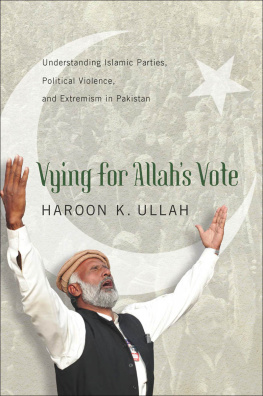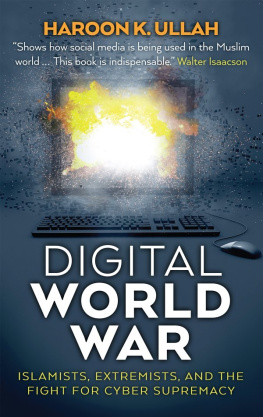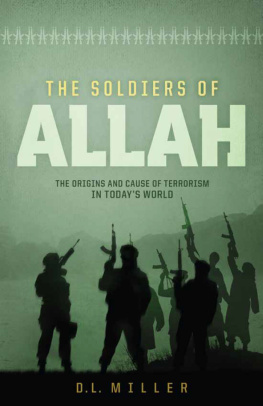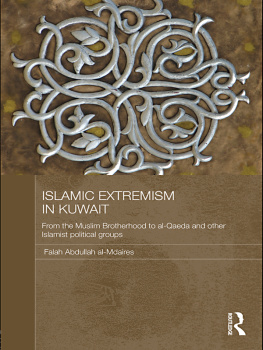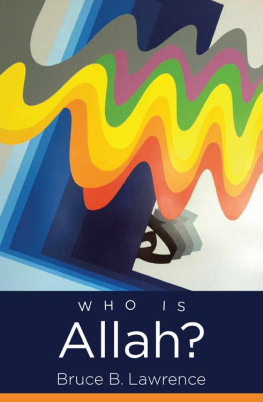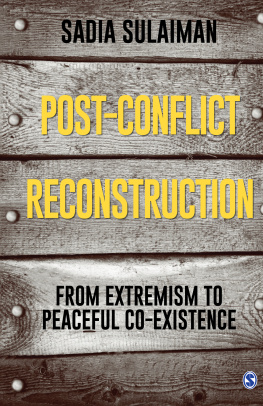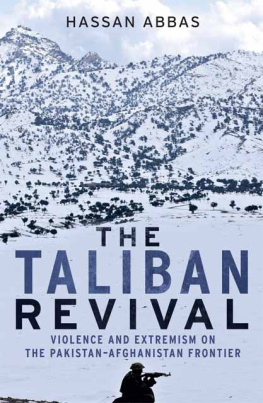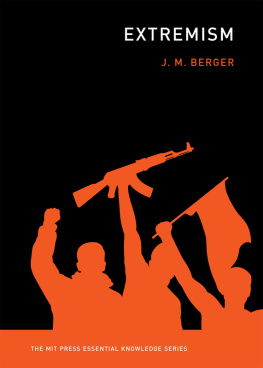Haroon K. Ullah - Vying for Allah’s Vote: Understanding Islamic Parties, Political Violence, and Extremism in Pakistan
Here you can read online Haroon K. Ullah - Vying for Allah’s Vote: Understanding Islamic Parties, Political Violence, and Extremism in Pakistan full text of the book (entire story) in english for free. Download pdf and epub, get meaning, cover and reviews about this ebook. year: 2013, publisher: Georgetown University Press, genre: Politics. Description of the work, (preface) as well as reviews are available. Best literature library LitArk.com created for fans of good reading and offers a wide selection of genres:
Romance novel
Science fiction
Adventure
Detective
Science
History
Home and family
Prose
Art
Politics
Computer
Non-fiction
Religion
Business
Children
Humor
Choose a favorite category and find really read worthwhile books. Enjoy immersion in the world of imagination, feel the emotions of the characters or learn something new for yourself, make an fascinating discovery.
- Book:Vying for Allah’s Vote: Understanding Islamic Parties, Political Violence, and Extremism in Pakistan
- Author:
- Publisher:Georgetown University Press
- Genre:
- Year:2013
- Rating:5 / 5
- Favourites:Add to favourites
- Your mark:
- 100
- 1
- 2
- 3
- 4
- 5
Vying for Allah’s Vote: Understanding Islamic Parties, Political Violence, and Extremism in Pakistan: summary, description and annotation
We offer to read an annotation, description, summary or preface (depends on what the author of the book "Vying for Allah’s Vote: Understanding Islamic Parties, Political Violence, and Extremism in Pakistan" wrote himself). If you haven't found the necessary information about the book — write in the comments, we will try to find it.
Haroon K. Ullah: author's other books
Who wrote Vying for Allah’s Vote: Understanding Islamic Parties, Political Violence, and Extremism in Pakistan? Find out the surname, the name of the author of the book and a list of all author's works by series.
Vying for Allah’s Vote: Understanding Islamic Parties, Political Violence, and Extremism in Pakistan — read online for free the complete book (whole text) full work
Below is the text of the book, divided by pages. System saving the place of the last page read, allows you to conveniently read the book "Vying for Allah’s Vote: Understanding Islamic Parties, Political Violence, and Extremism in Pakistan" online for free, without having to search again every time where you left off. Put a bookmark, and you can go to the page where you finished reading at any time.
Font size:
Interval:
Bookmark:
T. V. Paul, Series Editor
Rajesh Basrur
Maya Chadda
Stephen P. Cohen
C. Christine Fair
Timothy Hoyt
Paul Kapur
Rajesh Rajagopalan
Aseema Sinha
Afghan Endgames: Strategy and Policy Choices for Americas Longest War,
Hy Rothstein and John Arquilla, editors

JQ629.A979U453 2013
324.25491082dc23
 This book is printed on acid-free paper meeting the requirements of the American National Standard for Permanence in Paper for Printed Library Materials.
This book is printed on acid-free paper meeting the requirements of the American National Standard for Permanence in Paper for Printed Library Materials.and to He who bestows all blessings
Font size:
Interval:
Bookmark:
Similar books «Vying for Allah’s Vote: Understanding Islamic Parties, Political Violence, and Extremism in Pakistan»
Look at similar books to Vying for Allah’s Vote: Understanding Islamic Parties, Political Violence, and Extremism in Pakistan. We have selected literature similar in name and meaning in the hope of providing readers with more options to find new, interesting, not yet read works.
Discussion, reviews of the book Vying for Allah’s Vote: Understanding Islamic Parties, Political Violence, and Extremism in Pakistan and just readers' own opinions. Leave your comments, write what you think about the work, its meaning or the main characters. Specify what exactly you liked and what you didn't like, and why you think so.

